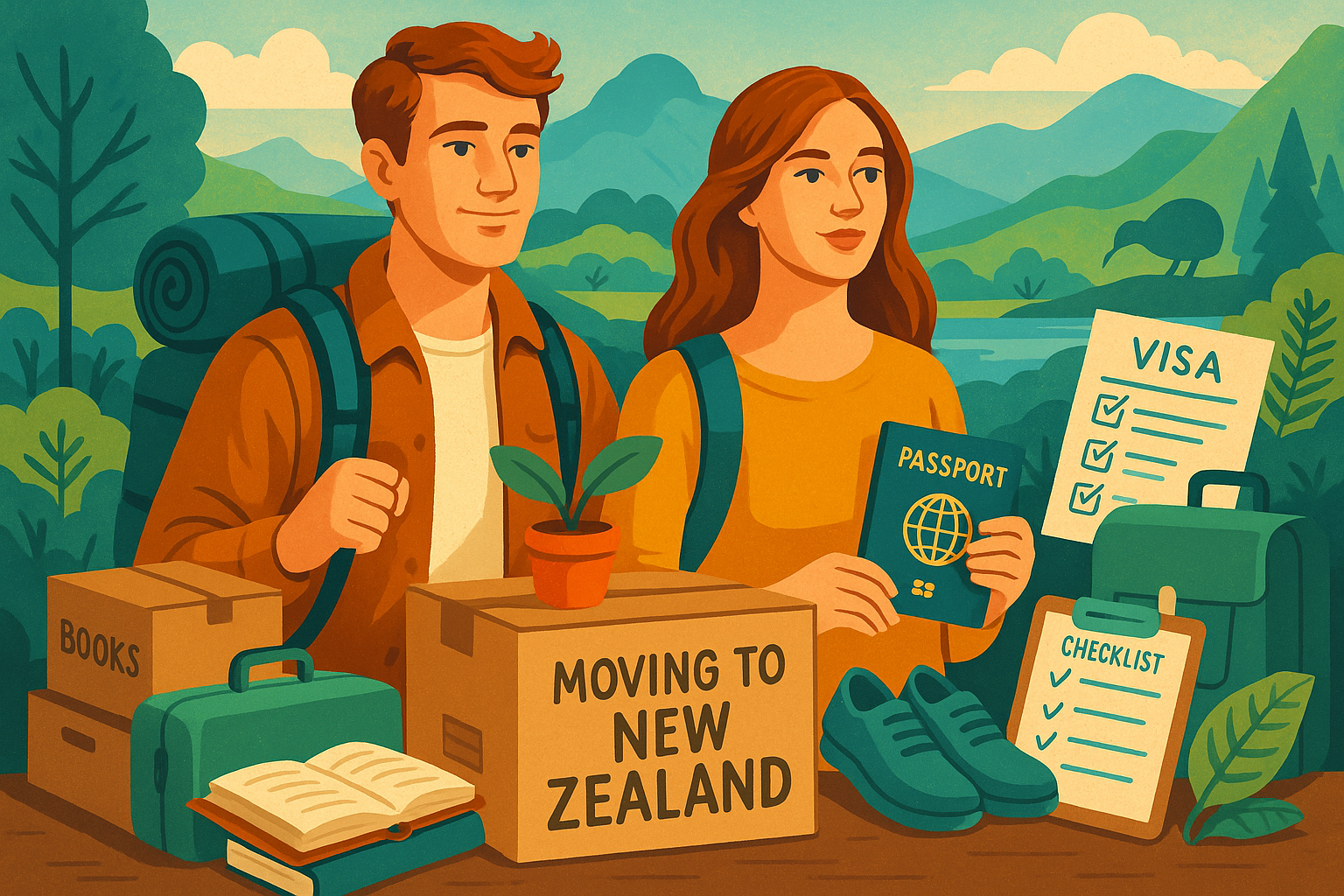Table of Contents
Understanding the Visa Process
Moving to New Zealand involves navigating a comprehensive visa process, which can vary depending on the individual’s circumstances. Various types of visas are available for prospective immigrants, including work visas, student visas, and residency options. Each type of visa has its specific requirements and processes that must be carefully considered.
For those seeking employment in New Zealand, a work visa is often the most appropriate choice. Skilled workers may apply under the Essential Skills Work Visa, which requires a job offer from a New Zealand employer. The application process typically includes submitting proof of qualifications and work experience, along with a medical examination. It is essential to ensure the job offer meets specific guidelines set by Immigration New Zealand to enhance the chances of a successful application.
For international students, pursuing education in New Zealand requires a student visa. Applicants must provide evidence of enrollment in an approved educational institution, financial stability, and healthcare cover during their stay. The student visa often allows for limited work hours, which can be beneficial for gaining local experience while studying.
Residency options, such as the Skilled Migrant Category, are available for individuals intending to settle permanently in New Zealand. This process usually involves a points-based assessment, factoring in age, experience, and qualifications. It is crucial to check eligibility criteria carefully as they can change according to national policies.
Throughout the visa application journey, maintaining meticulous documentation is vital. This includes a valid passport, health records, and police certificates. As processing times can vary considerably based on the visa type, it is advisable to start the application process well in advance and be prepared for potential delays. Consulting the Immigration New Zealand website for updates and guidelines is recommended to stay informed about any changes that may affect your application.

Finding the Right Location: Cities and Regions
Choosing the right location in New Zealand is a critical aspect for anyone considering relocation. The country boasts a diverse range of cities and regions, each with unique characteristics shaped by job availability, lifestyle preferences, climate variations, and cultural differences. Understanding these factors can significantly impact your experience as a new resident.
Auckland, as the largest city, is often seen as the economic powerhouse of New Zealand. It offers a vibrant job market, especially in industries such as technology, finance, and tourism. The lifestyle here is dynamic, with a multicultural population and a plethora of entertainment options, including restaurants, shopping centers, and outdoor activities. However, the cost of living is comparatively higher, which might be a significant consideration for newcomers.
Wellington, known as the capital city, provides a different atmosphere. It is notable for its arts and culture scene, complemented by a strong public sector job market. The climate in Wellington is more temperate, with strong winds, but this is counterbalanced by a close-knit community and an emphasis on work-life balance. The region also stands out for its stunning natural environment, including numerous hiking trails and beaches.
Christchurch, often referred to as the “Garden City,” presents a more affordable living option with ample opportunities for employment in sectors like agriculture, education, and healthcare. Following its rebuilding phase after the 2011 earthquake, Christchurch has seen significant development and investment, leading to enhanced infrastructure and amenities. The city’s community-focused approach and events promote a strong sense of belonging.
When selecting a location in New Zealand, consider factors that matter most to you, such as career opportunities, lifestyle expectations, and local amenities. Evaluating each city’s strengths and weaknesses will provide insights into which area aligns with your personal and professional goals, ensuring a smooth transition to life in this beautiful country.
Cost of Living in New Zealand
The cost of living in New Zealand can vary significantly depending on the region you choose to reside in. Major cities like Auckland and Wellington generally have higher living expenses compared to smaller towns or rural areas. Housing tends to be one of the most substantial expenses. In Auckland, for example, the average rent for a two-bedroom apartment can exceed NZD $2,500 per month, while in smaller cities such as Dunedin, this may fall to around NZD $1,500. Therefore, potential movers should carefully consider their housing options when evaluating living costs.
Utilities—which include electricity, heating, cooling, water, and garbage—typically average around NZD $250 to NZD $300 per month for a small apartment. Internet services can add an additional NZD $80 to NZD $120 monthly, depending on the provider and speed selected. Hence, potential residents must factor these expenses into their budget to accurately assess their financial requirements for living in New Zealand.
When it comes to food, grocery prices can vary, with a typical monthly budget for an individual ranging from NZD $300 to NZD $700. Eating out can also add to your monthly expenses, with an average meal at a mid-range restaurant costing approximately NZD $25 to NZD $40. Transportation costs similarly differ by region; while public transport in cities like Wellington is convenient, owning a car incurs fuel, insurance, and maintenance costs that can quickly add up.
Overall, the average salary in New Zealand range from NZD $60,000 to NZD $80,000, which aligns with the cost of living when judicious spending habits are practiced. Ultimately, lifestyle choices, including dining frequency, recreational activities, and housing preferences, play an integral role in determining one’s overall cost of living in this beautiful country.
Healthcare System Overview
New Zealand boasts a well-structured healthcare system that offers both public and private healthcare options to its residents and visitors. The public healthcare sector is predominantly funded by taxation, ensuring that essential medical services are accessible to all citizens and permanent residents. This means that most hospital care, emergency services, and primary healthcare visits are free or available at minimal costs. However, it is essential to note that many services within the public system can experience waiting times, particularly for non-urgent procedures.
For those who prefer to avoid potential wait times or seek more immediate care, private healthcare is also available. Private health insurance can cover a range of services, including elective surgeries, specialist consultations, and certain outpatient treatments. Various insurance policies are offered, ranging from comprehensive plans that cover a wide array of services to basic options that include only essential care. As a newcomer, it is advisable to evaluate these insurance packages carefully to determine which aligns with your health needs and budget.
To enroll in the healthcare services in New Zealand, newcomers must first register with a Local Health District or a designated healthcare provider. This usually involves completing a registration form and providing proof of residency. After enrollment, patients can access health services through the public system, although some individuals may find it beneficial to maintain private insurance to complement their healthcare needs.
Healthcare costs in New Zealand can vary widely. While public healthcare is largely free for residents, some costs such as prescription medications, dental care, and certain specialist visits can incur charges. New entrants to the country should also consider the importance of vaccinations and preventive care, particularly if they are coming from regions with different health risks. Overall, understanding New Zealand’s healthcare system is crucial for making informed decisions about healthcare access and insurance options upon relocation.
Education and Schooling Options
New Zealand offers a robust educational system that caters to a diverse population, including both children and adults. The structure is divided into three main educational levels: primary, secondary, and tertiary. Primary education typically begins at the age of five and continues until the age of eleven or twelve, encompassing years one through eight. During this period, students receive a holistic education that emphasizes literacy, numeracy, and personal development.
Secondary education follows primary schooling and covers years nine through thirteen, or ages twelve to eighteen. Students at this level have the option to pursue various academic and vocational pathways. The National Certificate of Educational Achievement (NCEA) is the primary qualification for secondary students, which is widely recognized throughout New Zealand and beyond. Educators aim to prepare students not only for academic success but also for the workforce or further studies.
For families relocating to New Zealand, international schools represent an appealing option, especially for expatriates seeking to maintain a curriculum similar to their home country. These institutions offer varying degrees of the International Baccalaureate (IB) program or the British A-levels, among other internationally recognized qualifications. However, enrollment in these schools can be competitive, often requiring early registration.
When selecting an educational path, families should consider their child’s individual needs and aspirations, as well as the differing approaches between state schools and private institutions. It can be beneficial to research local schools and visit potential options whenever possible. Furthermore, it’s important to familiarize oneself with the enrollment process, which can vary by institution and may involve an application, interviews, and assessments.
In conclusion, moving to New Zealand involves navigating a well-established education system offering a variety of schooling options. By understanding the available pathways and support structures, families can ensure a smooth educational transition for their children.
Cultural Adjustments and Integration
New Zealand, known for its stunning landscapes and welcoming ambience, offers a rich cultural tapestry woven from Māori, British, and various other influences. Understanding this unique cultural landscape is essential for newcomers intending to settle in the country. One of the primary aspects of Māori culture is the concept of whānau, meaning family, which extends beyond the immediate family unit to encompass close friends and community members. Emphasizing collective relationships, this inclusive view encourages newcomers to engage with the local community and form lasting social connections.
Social norms in New Zealand are generally characterized by an informal approach. Kiwis often prioritize equality, and it is common to address people by their first names, regardless of their status. This sense of egalitarianism is mirrored in daily interactions, where humor and laid-back communication are prevalent. Newcomers should also take note of the importance placed on punctuality; being on time is a sign of respect in both professional and personal settings. Understanding these social nuances will facilitate smoother interactions with locals.
When integrating into Kiwi culture, it is beneficial to embrace outdoor activities and local events. New Zealanders have a strong affinity for nature, and participating in recreational activities such as hiking, surfing, or attending local festivals can be an excellent way to meet people and experience the quintessential Kiwi way of life. Moreover, immersing oneself in the indigenous traditions and languages will not only enrich the experience but also foster appreciation for the local culture.
While moving to New Zealand can be an exciting journey, newcomers might encounter culture shock, especially in terms of communication styles and social etiquettes. It is vital to remain open-minded and approach these experiences with curiosity and patience. Engaging with local groups or community organizations can provide essential support and alleviate feelings of isolation, thereby paving the way for a successful transition into New Zealand society.
Employment Opportunities and Job Market
New Zealand’s job market has demonstrated resilience and adaptability, making it an attractive destination for expatriates seeking employment opportunities. With a diverse economy, several industries continue to see strong growth, including technology, healthcare, engineering, and primary industries such as agriculture and tourism. Understanding the landscape of in-demand sectors is crucial for job seekers aiming to maximize their chances of securing suitable positions.
One of the most effective ways to start the job search is by utilizing online platforms specifically tailored for New Zealand’s job market. Websites like Seek, Trade Me Jobs, and LinkedIn showcase a variety of job openings across multiple sectors. It is also advisable to connect with industry-specific recruitment agencies, which can offer personalized services and insights into local trends. Additionally, regional economic development agencies often provide useful information and networking opportunities for job seekers.
Crafting a New Zealand-style CV can significantly enhance your employability. Unlike resumes in other countries, a New Zealand CV tends to include personal details, a brief profile summary, relevant work experience, education, and skills that align with the job description. Emphasizing transferable skills and local certifications can play a pivotal role in appealing to recruiters who value local experience and qualifications.
When it comes to job interviews, preparation is key. Researching the company and understanding its core values can help candidates tailor their responses to align with what employers are looking for. Demonstrating cultural awareness and adaptability in interviews can set candidates apart from other applicants. Networking is also crucial; attending industry events, joining professional associations, and leveraging platforms like LinkedIn can significantly improve job prospects by fostering essential connections within the community.
Lastly, utilizing job support services can provide valuable resources for both newcomers and established residents. These services can include workshops on job search strategies, interview coaching, and assistance with CV writing. By taking advantage of these resources, individuals can navigate the job market in New Zealand more effectively, increasing their chances of finding rewarding employment opportunities.
Transportation and Getting Around
New Zealand offers a range of transportation options that cater to both residents and visitors, ensuring efficient mobility across its stunning landscapes. The primary modes of transport include public transport systems, personal vehicles, and cycling, each suitable for different needs and preferences. In major cities such as Auckland, Wellington, and Christchurch, public transport is widely available, comprising bus, train, and ferry services. These systems are particularly beneficial for those looking to commute without the expense and responsibility of car ownership.
In Auckland, for instance, the AT Metro network provides comprehensive bus and train services, while Wellington boasts a reliable and extensive bus system alongside the iconic cable cars. Timetable information is conveniently accessible through various mobile applications, which can help you plan your journeys effectively. Utilizing public transport can be both economical and environmentally friendly, making it an attractive alternative for individuals who prefer not to drive.
However, living without a car in New Zealand is feasible, primarily in urban areas where amenities and services are concentrated. While public transport is reliable, there may be limitations in rural regions, where services are less frequent. For those who prioritize convenience or reside outside major metropolitan hubs, car ownership becomes advantageous. New Zealand’s road rules are straightforward, and it is essential to familiarize yourself with the local driving regulations, including speed limits, lane usage, and the critical rule of driving on the left side of the road.
For residents who choose to cycle, many cities offer dedicated bike lanes, promoting a healthy and sustainable mode of transport. In conclusion, understanding the transportation options available is crucial for seamless navigation in New Zealand, whether through public transit, car ownership, or cycling. Selecting the most suitable mode can significantly enhance your mobility and overall experience in this beautiful country.
Packing Essentials and Relocation Tips
Relocating to New Zealand is an exciting journey that requires thorough preparation, particularly regarding what to pack and how to streamline the moving process. The first step is to evaluate your belongings and determine what items are essential to bring. Personal documents such as passports, birth certificates, driver’s licenses, and medical records should be kept in a secure and accessible place during the relocation process. It is advisable to maintain photocopies of these documents as a precaution.
When considering household items, focus on bringing items that have both sentimental value and practicality, such as family heirlooms, essential kitchenware, or quality bedding. However, keep in mind that larger furniture items might be more cost-effective to purchase in New Zealand, where you can find suitable alternatives through local shops or online platforms. Furthermore, compact living spaces are common in New Zealand, so consider downsizing before your move. A well-organized approach can significantly ease the packing process; consider creating an inventory list that categorizes items into essentials, non-essentials, and items to purchase in New Zealand.
Logistics play a vital role in the relocation process. Engaging a reliable shipping company can streamline the movement of your belongings to New Zealand. Ensure that all items are adequately packed to prevent damage during transit. Familiarize yourself with customs regulations; certain items, such as food, plants, and animal products, may be subject to restrictions or prohibitions. It is crucial to declutter and remove any items that may raise red flags during customs inspections. By understanding these guidelines and maintaining organized documentation, you will facilitate a smoother transition to your new home in New Zealand.







Hi my friend! I want to say that this post is awesome, nice written and come with approximately all vital infos. I’d like to see more posts like this.
Thanks for ones marvelous posting! I really enjoyed reading it, you’re a great author.I will be sure to bookmark your blog and will come back at some point. I want to encourage you to continue your great job, have a nice weekend!